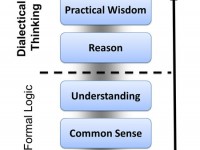The essence of the cognitive dimension of CDF has to do with how adults differ in making cognitive sense (rather than meaning) of their life and work experiences, thus with what they do and do not understand about the real world. These differences go far beyond “what is in the head” since how people construct the world conceptually precedes their actions in the world, and thus equally manifests in their activities, planning, goal setting, decision making, and execution of leadership functions. In most general terms, students learn to switch from “what” to think to “how” to think, thereby gaining fluidity of thinking based on an awareness of their present way of thinking that makes some things “unthinkable” to them.
In this life-changing course, students gain insight not only into the theory of cognitive development and the development of dialectic, but also begin to apply dialectical thought forms in text analysis, in cohort discussion, and in coaching interventions with individuals and teams.
